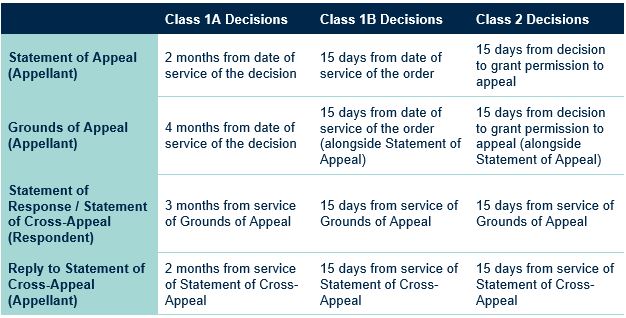Appeals in the UPC
20.06.2023
Introduction
UPC appeals will be heard by the Court of Appeal, located in Luxembourg
This article provides an overview of the key provisions relating to appeals, in particular Articles 73-75 of the UPC Agreement (“UPCA”) and Rules 220-255 of the Rules of Procedure (“RoP”). It also addresses applications for rehearing (Article 81 UPCA and Rules 245 – 255 RoP) and referrals to the Court of Justice of the European Union (Articles 21 and 38 UPCA and Rule 266 RoP).
What may be appealed?
Appeals may be brought by any party that has been unsuccessful in whole or in part in its submissions. They are available as of right against:
- final decisions of the Court of First Instance[1] and decisions terminating proceedings as regards one of the parties (referred to in this article as “Class 1A Decisions”); and
- orders (i) to hold the proceedings in the language of the patent, (ii) to produce evidence, (iii) to preserve evidence and inspect premises, (iv) freezing orders, (v) for provisional and protective measures (including preliminary injunctions, seizures or delivery up) and (vi) to communicate information regarding infringement products (referred to in this article as “Class 1B Decisions”).
Appeals against orders other than those set out above (referred to in this article as “Class 2 Decisions”) may be appealed together with the appeal against the final decision. Class 2 Decisions may be appealed separately with the leave of the Court of First Instance or, if the request to the Court of First Instance is unsuccessful, the Court of Appeal. Leave to appeal must also be sought in the case of an appeal against a decision of the Court of the First Instance in relation to costs or a decision of the European Patent Office (EPO) to reject a request for unitary effect (Rules 220 and 221 RoP). UPC judges have stated that, while the UPC is in its early stages, the Court of Appeal is likely to grant permission to appeal interim decisions liberally in order to promote early harmonisation.
Appeals may be based on points of fact and/or law (Article 73(3) UPCA). However, new facts and new evidence may only be introduced where their submission could not reasonably have been expected during proceedings before the Court of First Instance. The Court of Appeal may choose to disregard any new requests, facts and/or evidence, taking into account whether a party seeking to lodge new submissions is able to justify that the new submissions could not reasonably have been made during the first instance proceedings, the relevance of the new submissions and the position of the other party (Article 73(4) UPCA and Rule 222 RoP). We understand that a number of UPC judges have taken the position publicly that appeals should primarily be conducted based on the case before the Court of First Instance and that there will be little to no opportunity to introduce new facts or evidence on appeal.
Composition of the Court
Appeals before the Court of Appeal will be heard by a panel of five judges. The panel will comprise three legally qualified judges who are nationals of different contracting member states and two technically qualified judges with qualifications and experience in the relevant technical field (Article 9 UPCA). A legally qualified judge will be designated the judge-rapporteur (Rule 231 RoP).
If the panel considers the case to be of exceptional importance and, in particular, where the decision may affect the consistency and unity of the case law of the UPC, it may refer the case to the full Court of Appeal (Rule 238 RoP). The full court consists of the President of the Court of Appeal (Dr Klaus Grabinski, currently a judge in the German Federal Court of Justice) and not less than ten legally and technically qualified judges of the Court of Appeal, representing the initial two panels of the Court of Appeal. If the number of panels of the Court of Appeal increase beyond two, five additional legal and technically qualified judges will be appointed for each additional panel. According to Rule 238A(3) RoP, decisions of the full Court of Appeal will require a three-quarters majority, however it is not clear what will happen if a three-quarters majority is not reached.
Given that, at the date of writing, there have only been seven legally qualified judges appointed to the Court of Appeal, it appears that these judges are likely to have a high case load once the system commences.
Do appeals have suspensive effect?
Whether an appeal has suspensive effect depends on the type of decision. The default position under Article 74 UPCA is that an appeal will not have suspensive effect unless it is an appeal against either a revocation decision or a decision of the EPO relating to the administration of unitary patents. However, a party may make a request to the Court of Appeal for suspensive effect in relation to decisions other than Class 2 Decisions, in which case a decision should be taken by the Court of Appeal without delay (Rule 223 RoP).
Appeals against Class 1B Decisions will not stop main proceedings, although the Court of First Instance will not issue a decision before the Court of Appeal decision. It is, however, difficult to see how first instance proceedings can continue in practice if, for example, the language of proceedings is subject to appeal or key evidence is not available while a party is appealing an order. If appeal decisions are not reached quickly (which may be the case if there are a large number of appeals in the early days of the UPC given the small number of judges appointed to the Court of Appeal), first instance proceedings could be significantly delayed by pending appeals.
In relation to Class 2 Decisions, appeals will not have suspensive effect and the Court of First Instance may issue a decision before the Court of Appeal has decided on the appeal. This means that appeals against orders such as those relating to experts (which can be fundamental in patent cases) will not have suspensive effect and it is possible that the Court of First Instance could come to a decision prior to the appeal being heard. If the appeal was then successful, a complete rehearing might then be needed (see below).
A flexible approach might therefore be required, with the Court of First Instance exercising its general case management powers.
Procedure and timelines
The deadlines for filing and responding to an appeal (Rules 224 – 238 RoP) depend on the type of decision, as set out in the table below:
The Statement of Appeal is a brief statement setting out details of the appellant and respondent, their respective representatives and service details and the order or remedy sought by the appellant. It should also include any order for expedition and the reasons justifying an order for expedition (Rule 225 RoP).
The Grounds of Appeal should indicate which parts of the decision or order are contested, include reasons for setting aside the decision and indicate the facts and evidence on which the appeal is based (Rule 226 RoP). If the Grounds of Appeal do not comply with these requirements, the appellant will be given leave to amend the Grounds of Appeal by a deadline that will be set by the judge-rapporteur, however no new grounds of appeal can be raised beyond the deadline (Rule 233 RoP). For Class 1A Decisions, the staggered submission of the Statement of Appeal and Grounds of Appeal allows time to prepare relevant arguments against a decision. However, in relation to appeals against Class 1B Decisions and Class 2 Decisions, appellants have only 15 days to submit both documents covering all the substantive arguments.
The deadlines for the Statement of Response by the respondent are similarly tight, with responses to appeals against Class 1B Decisions and Class 2 Decisions due within 15 days of service of the Grounds of Appeal. In its Statement of Response, a respondent may support the Court of First Instance decision on grounds other than those given in the decision (Rule 236 RoP). In addition, a respondent may include a Statement of Cross-Appeal with the Statement of Response, even if the deadline for lodging a Statement of Appeal has passed (Rule 237 RoP).
Given the tight deadlines, users of the UPC system should be prepared to respond quickly and ensure that appropriate internal policies are in place to ensure service of any order, decision or appeal is communicated to the relevant legal team as early as possible.
After expiry of all the time periods in the written procedure the judge-rapporteur will make arrangements for the oral hearing of the appeal. The judge-rapporteur will give at least 2 months’ notice of an oral hearing except where (i) the appeal is against a Class 1B Decision or Class 2 Decision, (ii) there is an order for expedition or (iii) the parties agree to a shorter time period (Rule 239 RoP). However, there is no provision in the RoP as to when an appeal should be heard or when a subsequent decision will be issued by the Court of Appeal.
The Court of Appeal will either reject the appeal or set aside the decision or order totally or in part substituting its own decision or order, including an order for costs at first instance and on appeal (Rule 242 RoP). The Court of Appeal may refer a case back to the Court of First Instance for a decision or retrial. However, this will only occur in exceptional circumstances and the Court of First Instance will be bound by the decision of the Court of Appeal and its ratio decidendi (Rules 242 – 243 RoP).
Applications for rehearing
The Court of Appeal is the highest court in the UPC so an appeal to the Court of Appeal should lead to a final decision. However, there is provision in the UPCA and RoP for an application for rehearing in limited circumstances (Article 81 UPCA and Rules 245 – 255 RoP).
An application for rehearing can be lodged at the Court of Appeal by any party adversely affected by a final decision of the Court of First Instance (where the time for lodging an appeal has expired) or of the Court of Appeal. Such an application of rehearing will only be granted “exceptionally” in circumstances where there has been a fundamental procedural defect or a court decision regarding a criminal defence. An application for rehearing on the basis of a fundamental procedural defect is only admissible where (i) the procedural defect has been raised at the Court of First Instance or Court of Appeal and dismissed (unless the defect could not have been raised) and (ii) the party has not failed to bring an appeal in respect of the defect where it had an opportunity to do so. The application will not have suspensive effect unless the Court of Appeal decides otherwise.
The application for rehearing will be assigned to a panel of 3 legally qualified judges. The President of the Court of Appeal “may” order that judges who participated in the decision under review shall not sit on the panel, so this does not appear to be a mandatory requirement.
After hearing the application for a rehearing the panel may either reject the application for rehearing (majority vote required), or allow the application and give directions for future proceedings. Allowing the application sets aside or suspends the decision under review (in whole or in part) and re-opens the proceedings for a new hearing and decisions.
Referrals to the Court of Justice of the European Union (CJEU)
Questions of EU law may be also referred to the CJEU by Courts of the UPC (Articles 21 and 38 UPCA and Rule 266 RoP). Since that the analysis of patent infringement and validity (outside specific harmonised areas such as supplementary protection certificates for pharma patents) is unlikely to involve questions of substantive EU law, it has been suggested that the majority of cases heard by the UPC are unlikely to raise any issues within the competence of the CJEU. Given, however, the fact that EU law is said to be the primary source of law for the new Court, and the inventiveness of lawyers, it remains to be seen whether or not that will be the case.
Where a reference is made, the Court has a discretion to stay the proceedings. If proceedings are not stayed, judgment may not be given until the CJEU has given a ruling. As a result, even if referrals to the CJEU end up being rare, these could lead to significant delays in decision-making by the UPC.
==============================================
[1] Including decisions (i) to allow a preliminary objection, (ii) to dispose of an action, (iii) that the Court of First Instance lacks jurisdiction or that a claim or defence is manifestly inadmissible or lacking any foundation in law and (iv) that there exists an absolute bar to proceeding with an action, for example based on application of the res judicata principle.

Charlie French
Author

Florence Plisner
Author
